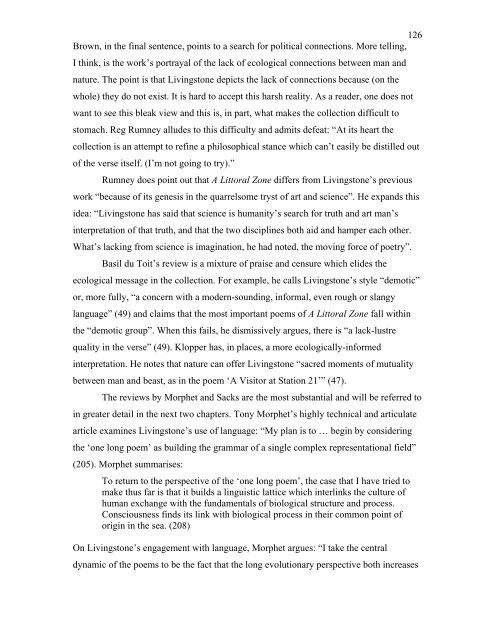"Symbiosis or Death": - Rhodes University
"Symbiosis or Death": - Rhodes University
"Symbiosis or Death": - Rhodes University
You also want an ePaper? Increase the reach of your titles
YUMPU automatically turns print PDFs into web optimized ePapers that Google loves.
126<br />
Brown, in the final sentence, points to a search f<strong>or</strong> political connections. M<strong>or</strong>e telling,<br />
I think, is the w<strong>or</strong>k’s p<strong>or</strong>trayal of the lack of ecological connections between man and<br />
nature. The point is that Livingstone depicts the lack of connections because (on the<br />
whole) they do not exist. It is hard to accept this harsh reality. As a reader, one does not<br />
want to see this bleak view and this is, in part, what makes the collection difficult to<br />
stomach. Reg Rumney alludes to this difficulty and admits defeat: “At its heart the<br />
collection is an attempt to refine a philosophical stance which can’t easily be distilled out<br />
of the verse itself. (I’m not going to try).”<br />
Rumney does point out that A Litt<strong>or</strong>al Zone differs from Livingstone’s previous<br />
w<strong>or</strong>k “because of its genesis in the quarrelsome tryst of art and science”. He expands this<br />
idea: “Livingstone has said that science is humanity’s search f<strong>or</strong> truth and art man’s<br />
interpretation of that truth, and that the two disciplines both aid and hamper each other.<br />
What’s lacking from science is imagination, he had noted, the moving f<strong>or</strong>ce of poetry”.<br />
Basil du Toit’s review is a mixture of praise and censure which elides the<br />
ecological message in the collection. F<strong>or</strong> example, he calls Livingstone’s style “demotic”<br />
<strong>or</strong>, m<strong>or</strong>e fully, “a concern with a modern-sounding, inf<strong>or</strong>mal, even rough <strong>or</strong> slangy<br />
language” (49) and claims that the most imp<strong>or</strong>tant poems of A Litt<strong>or</strong>al Zone fall within<br />
the “demotic group”. When this fails, he dismissively argues, there is “a lack-lustre<br />
quality in the verse” (49). Klopper has, in places, a m<strong>or</strong>e ecologically-inf<strong>or</strong>med<br />
interpretation. He notes that nature can offer Livingstone “sacred moments of mutuality<br />
between man and beast, as in the poem ‘A Visit<strong>or</strong> at Station 21’” (47).<br />
The reviews by M<strong>or</strong>phet and Sacks are the most substantial and will be referred to<br />
in greater detail in the next two chapters. Tony M<strong>or</strong>phet’s highly technical and articulate<br />
article examines Livingstone’s use of language: “My plan is to … begin by considering<br />
the ‘one long poem’ as building the grammar of a single complex representational field”<br />
(205). M<strong>or</strong>phet summarises:<br />
To return to the perspective of the ‘one long poem’, the case that I have tried to<br />
make thus far is that it builds a linguistic lattice which interlinks the culture of<br />
human exchange with the fundamentals of biological structure and process.<br />
Consciousness finds its link with biological process in their common point of<br />
<strong>or</strong>igin in the sea. (208)<br />
On Livingstone’s engagement with language, M<strong>or</strong>phet argues: “I take the central<br />
dynamic of the poems to be the fact that the long evolutionary perspective both increases

















